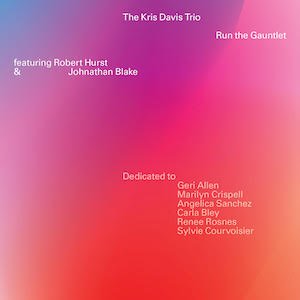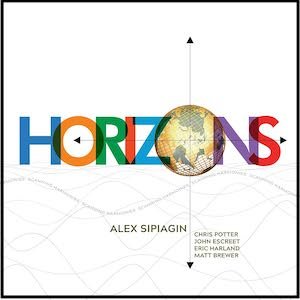Label: Pyroclastic Records, 2024
Personnel - Kris Davis: piano; Robert Hurst: bass; Johnathan Blake: drums.
Pianist, composer, improviser, and label owner Kris Davis has been forging her own distinctive path in the creative jazz scene, earning widespread acclaim. In Run the Gauntlet, Davis returns to the piano trio format for the first time in a decade, teaming up with seasoned bassist Robert Hurst and sensitive drummer Johnathan Blake. The album pays tribute to six extraordinary women pianists who have profoundly shaped her sound and influenced her musical direction: Geri Allen, Marilyn Crispell, Angelica Sanchez, Carla Bley, Renee Rosnes, and Sylvie Courvoisier.
Straddling the line between post-bop and avant-garde jazz, the title track, “Run the Gauntlet”, opens with a palpable tension, featuring odd-metered ostinatos that weave in and out over the rhythmic turmoil of bass and drums. The piece gradually finds a groove, with dynamic shifts and tempo changes, as the trio delivers head-spinning improvisations. Blake's drumming intensifies the conclusion by erecting a massive wall of snare, cymbals, and toms. “Knotweed” hints at prog-rock in its initial moments before slipping into Monk/Coltrane territory in its firmly outlined head. The trio swings with humor and grace, pushing the piece into a frenetic avant-garde finale.
Davis rarely delves deeply into jazz tradition, but when she does, the result is forward-leaning music sculpted with charm and spontaneous creativity. Her prepared piano takes on world music influences in “Softly, As You Wake” and the freely improvised “Subtones”, both of which feature deep, resonant arco bass and gamelan-like rhythmic pulsations. The latter piece evolves into a freewheeling, groovy atmosphere, bearing a resemblance to the meditative version of Blake’s “Beauty Beneath the Rubble”, while its original version takes on the form of a tranquil rubato hymn, gently brushed to a shimmering finish.
Davis also composed a three-part composition inspired by her son’s growth. “First Steps” is a solo piano piece that balances passion and detachment, offering pulse, motion, and freedom. “Little Footsteps” brings a snappy polyrhythmic feel that, borrowing from funk, also draws from electronic and modern creative jazz, with Hurst’s dancing bass lines blurring the boundaries between these genres. “Heavy-Footed” centers around a riff set within a 10-beat cycle that occasionally slows, striking a balance between jagged and smooth edges. Each note played emerges beveled.
The trio is clearly having fun in Run the Gauntlet, a mature, boundary-pushing record made by adventurous instrumentalists whose rapport is no less than wonderful.
Favorite Tracks:
01 - Run the Gauntlet ► 04 - Little Footsteps ► 08 - Knotweed








































